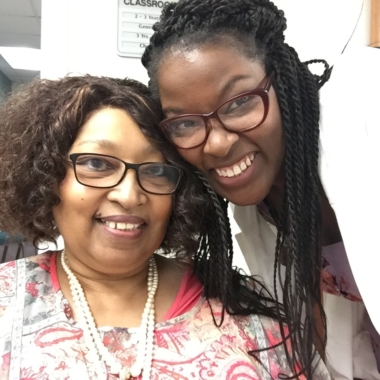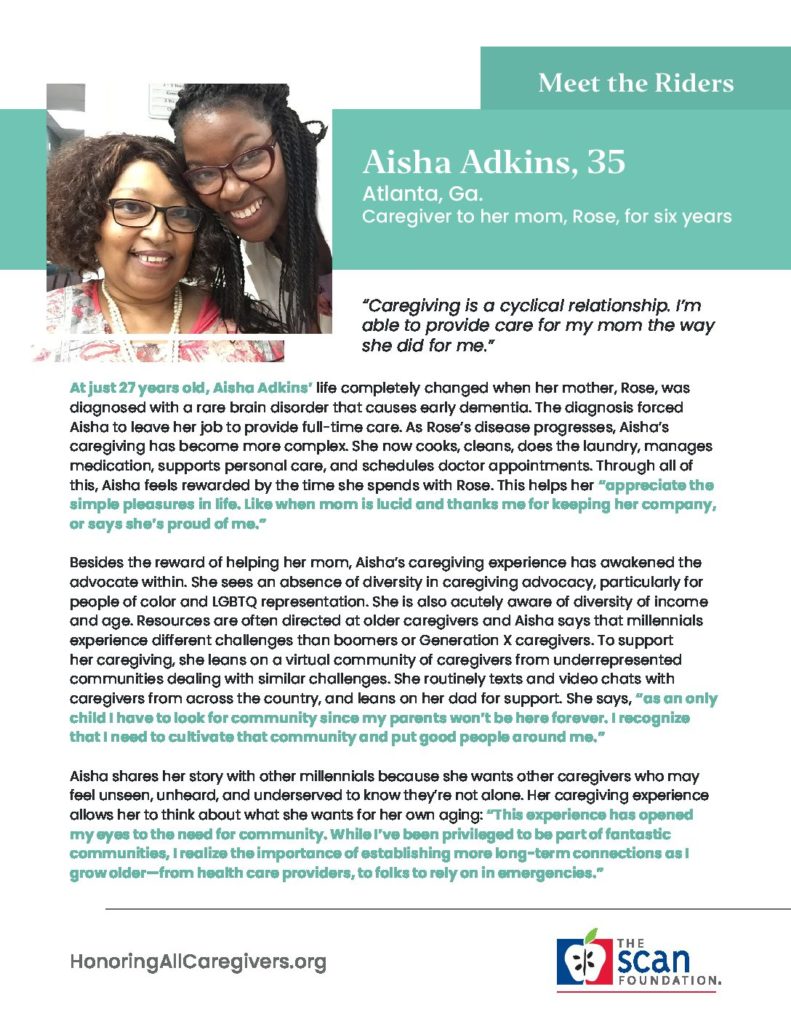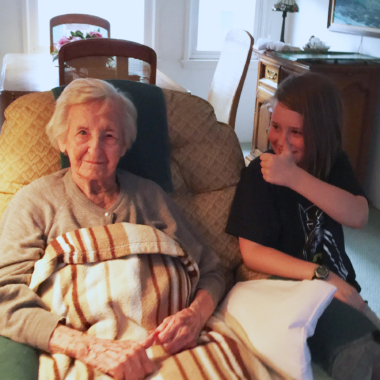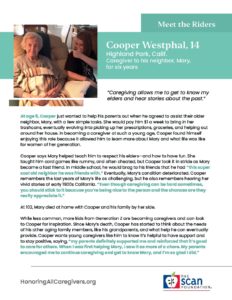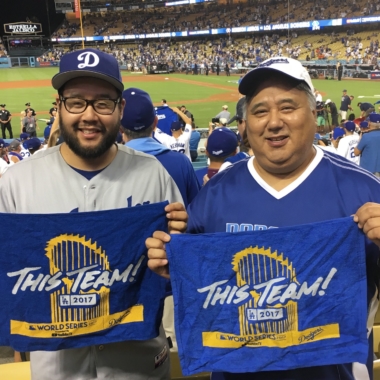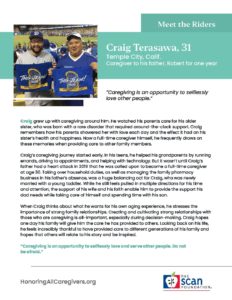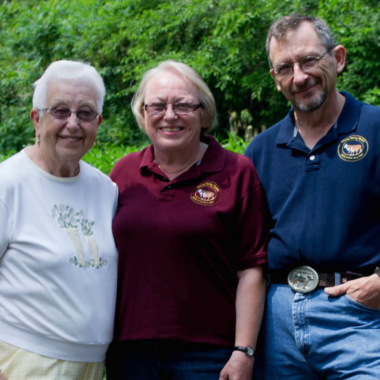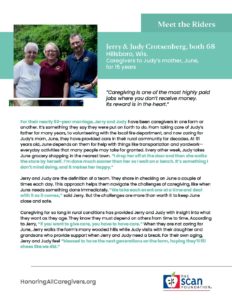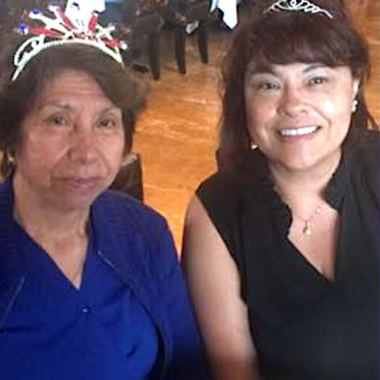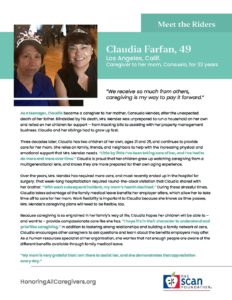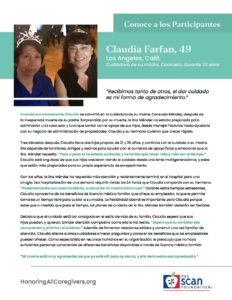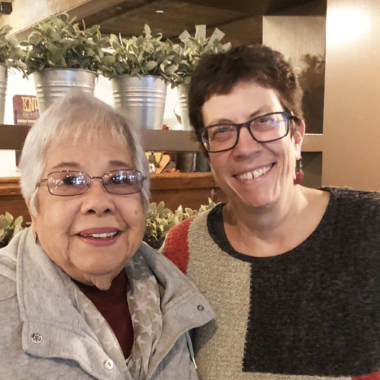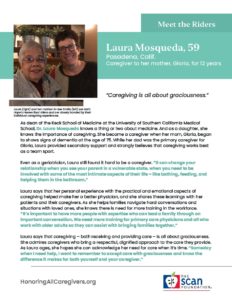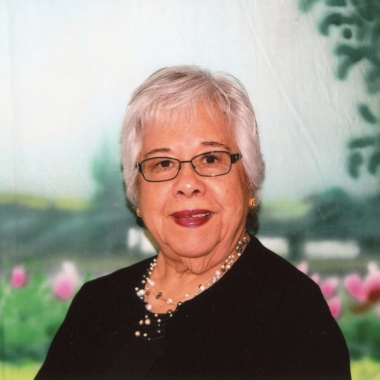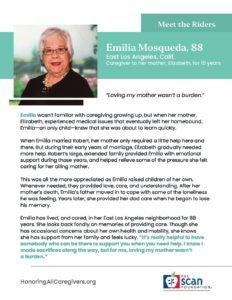Hope’s Heroes
More than 41 million Americans serve as family caregivers, maybe even you.
Honoring Caregivers of All Generations
Family caregivers represent all ages, backgrounds, and cultures and serve as unsung heroes in the lives of older loved ones. They deserve recognition for everything they balance in their lives. Their stories also inspire conversations about what people want for their own aging experience. We celebrated family caregivers through Hope’s Heroes: Honoring Caregivers of All Generations, a float at the 2020 Rose Parade® presented by Honda. Missed the parade? A video below shows a highlight of our float participation. 
Join us to honor a caregiver you know on social media by sharing your story of #aging and #caregiving.
Video Highlights
Leeza Gibbons Introduces The SCAN Foundation's Float
Watch the Hope’s Heroes float in action at the 2020 Tournament of Roses® parade.
Two Caregivers Discuss Their Experience
In this video, our youngest float riders, Craig Terasawa and Cooper Westphal, talk about their experiences helping family and friends.
Laura Farber Discusses Riding on the TSF Float!
Laura Farber, president of the 2020 Tournament of Roses®, discusses riding on The SCAN Foundation's float, Hope's Heroes: Honoring Caregivers of All Generations. Laura joined the Foundation for the float's first test drive.
Video Highlights
Get to know our riders!
These caregiver heroes rode on our Rose Parade float. Their stories inspire conversations about caregiving and what people want for their own aging experience.
MILLENNIAL
Meet Aisha
Aisha, 35, quit a job to care for her mom, and raises awareness about the needs of caregivers in underserved communities.
GENERATION Z
Meet Cooper
Cooper, 14, cared for his older neighbor, Mary, since elementary school and learned how to play cards along the way!
MILLENNIAL
Meet Craig
Craig, 31, runs the family pharmacy while caring for his father and being a doting husband and active dad.
BABY BOOMERS
Meet Jerry & Judy
Jerry and Judy, both 68, are dedicated to each other and caregiving while managing the family farm in Wisconsin.
GENERATION X
Meet Claudia
Claudia, 49, has cared for her mom, Consuelo, for 33 years and is appreciative of the work flexibility her employer offers.
GENERATION X | SPANISH
Conoce a Claudia
Claudia, de 49 años, ha cuidado a su madre, Consuelo, durante 33 años y aprecia la flexibilidad laboral que ofrece su empleador.
BABY BOOMER
Meet Laura
Laura, 59, helped care for her mother for 12 years, and is the first female dean of USC’s Keck School of Medicine.
SILENT GENERATION
Meet Emilia
Emilia, 88, has lived in her East LA home for 63 years. As an only child, she took care of her parents while raising her own family.
Meet Aisha
At just 27 years old, Aisha Adkins’ life completely changed when her mother, Rose, was diagnosed with a rare brain disorder that causes early dementia. The diagnosis forced Aisha to leave her job to provide full-time care. As Rose’s disease progresses, Aisha’s caregiving has become more complex. She now cooks, cleans, does the laundry, manages medication, supports personal care, and schedules doctor appointments. Through all of this, Aisha feels rewarded by the time she spends with Rose. This helps her “appreciate the simple pleasures in life. Like when mom is lucid and thanks me for keeping her company, or says she’s proud of me.”
Besides the reward of helping her mom, Aisha’s caregiving experience has awakened the advocate within. She sees an absence of diversity in caregiving advocacy, particularly for people of color and LGBTQ representation. She is also acutely aware of diversity of income and age. Resources are often directed at older caregivers and Aisha says that millennials experience different challenges than boomers or Generation X caregivers. To support her caregiving, she leans on a virtual community of caregivers from underrepresented communities dealing with similar challenges. She routinely texts and video chats with caregivers from across the country, and leans on her dad for support. She says, “as an only child I have to look for community since my parents won’t be here forever. I recognize that I need to cultivate that community and put good people around me.” Aisha shares her story with other millennials because she wants other caregivers who may feel unseen, unheard, and underserved to know they’re not alone. Her caregiving experience allows her to think about what she wants for her own aging: “This experience has opened my eyes to the need for community. While I’ve been privileged to be part of fantastic communities, I realize the importance of establishing more long-term connections as I grow older—from health care providers, to folks to rely on in emergencies.”
Meet Cooper
At age 5, Cooper just wanted to help his parents out when he agreed to assist their older neighbor, Mary, with a few simple tasks. She would pay him $1 a week to bring in her trashcans, eventually evolving into picking up her prescriptions, groceries, and helping out around her house. In becoming a caregiver at such a young age, Cooper found himself enjoying this role because it allowed him to learn more about Mary and what life was like for women of her generation. Cooper says Mary helped teach him to respect his elders—and how to have fun. She taught him card games like rummy, and often cheated, but Cooper took it in stride as Mary became a fast friend. In middle school, he would brag to his friends that he had “this super cool old neighbor he was friends with.” Eventually, Mary’s condition deteriorated. Cooper remembers the last years of Mary’s life as challenging, but he also remembers hearing her vivid stories of early 1900s California. “Even though caregiving can be hard sometimes, you should stick to it because you’re being nice to the person and the chances are they really appreciate it.” At 102, Mary died at home with Cooper and his family by her side. While less common, more kids from Generation Z are becoming caregivers and can look to Cooper for inspiration. Since Mary’s death, Cooper has started to think about the needs of his other aging family members, like his grandparents, and what help he can eventually provide. Cooper wants young caregivers like him to know it’s helpful to have support and to stay positive, saying, “my parents definitely supported me and reinforced that it’s good to care for others. When I was first helping Mary, I saw it as more of a chore. My parents encouraged me to continue caregiving and get to know Mary, and I’m so glad I did.”
Meet Craig
Craig grew up with caregiving around him. He watched his parents care for his older sister, who was born with a rare disorder that required around-the-clock support. Craig remembers how his parents showered her with love each day and the effect it had on his sister’s health and happiness. Now a full-time caregiver himself, he frequently draws on these memories when providing care to other family members. Craig’s caregiving journey started early. In his teens, he helped his grandparents by running errands, driving to appointments, and helping with technology. But it wasn’t until Craig’s father had a heart attack in 2019 that he was called upon to become a full-time caregiver at age 30. Taking over household duties, as well as managing the family pharmacy business in his father’s absence, was a huge balancing act for Craig, who was newly married with a young toddler. While he still feels pulled in multiple directions for his time and attention, the support of his wife and his faith enable him to provide the support his dad needs while taking care of himself and spending time with his son. When Craig thinks about what he wants for his own aging experience, he stresses the importance of strong family relationships. Creating and cultivating strong relationships with those who are caregiving is all-important, especially during decision-making. Craig hopes one day his family will give him the care he has provided to others. Looking back on his life, he feels incredibly thankful to have provided care to different generations of his family and hopes that others will relate to his story and be inspired. “Caregiving is an opportunity to selflessly love and serve other people. Do not be afraid.”
Meet Jerry & Judy
For their nearly 50-year marriage, Jerry and Judy have been caregivers in one form or another. It’s something they say they were put on Earth to do. From taking care of Judy’s father for many years, to volunteering with the local fire department, and now caring for Judy’s mom, June, they have provided care in their rural community for decades. At 91 years old, June depends on them for help with things like transportation and yard work — everyday activities that many people may take for granted. Every other week, Judy takes June grocery shopping in the nearest town. “I drop her off at the door and then she walks the store by herself. I’m done much sooner than her so I wait on a bench. It’s something I don’t mind doing, and it makes her happy.”
Jerry and Judy are the definition of a team. They share in checking on June a couple of times each day. This approach helps them navigate the challenges of caregiving, like when June needs something done immediately. “We take each event one at a time and deal with it as it comes,” said Jerry. But the challenges are more than worth it to keep June close and safe. Caregiving for so long in rural conditions has provided Jerry and Judy with insight into what they want as they age. They know they must depend on others from time to time. According to Jerry, “if you want to give care, you have to have care.” When they are not caring for June, Jerry walks the farm’s many wooded hills while Judy visits with their daughter and grandsons who provide support when Jerry and Judy need a break. For their own aging, Jerry and Judy feel “blessed to have the next generations on the farm, hoping they’ll fill shoes like we did.”
Meet Claudia
As a teenager, Claudia became a caregiver to her mother, Consuelo Mendez, after the unexpected death of her father. Blindsided by his death, Mrs. Mendez was unprepared to run a household on her own and relied on her children for support – from tracking bills to assisting with her property management business. Claudia and her siblings had to grow up fast. Three decades later, Claudia has two children of her own, ages 21 and 25, and continues to provide care for her mom. She relies on family, friends, and neighbors to help with the increasing physical and emotional support that Mrs. Mendez needs. “Little by little I’ve been taking care of her, and I’ve had to do more and more over time.” Claudia is proud that her children grew up watching caregiving from a multigenerational lens, and knows they are more prepared for their own aging experience. Over the years, Mrs. Mendez has required more care, and most recently ended up in the hospital for surgery. That week-long hospitalization required round-the-clock visitation that Claudia shared with her brother. “With each subsequent incident, my mom’s health declined.” During these stressful times, Claudia takes advantage of the family medical leave benefits her employer offers, which allow her to take time off to care for her mom. Work flexibility is important to Claudia because she knows as time passes, Mrs. Mendez’s caregiving plans will need to be flexible, too. Because caregiving is so engrained in her family’s way of life, Claudia hopes her children will be able to – and want to – provide compassionate care like she has. “I hope it’s in their character to understand and prioritize caregiving.” In addition to fostering strong relationships and building a family network of care, Claudia encourages other caregivers to ask questions and learn about the benefits employers may offer. As a human resources specialist at her organization, she worries that not enough people are aware of the different benefits available through family medical leave. “My mom is very grateful that I am there to assist her, and she demonstrates that appreciation every day.”
Conoce a Claudia
Cuando era adolescente, Claudia se convirtió en la cuidadora de su madre, Consuelo Méndez, después de la inesperada muerte de su padre. Sorprendida por su muerte, la Sra. Méndez no estaba preparada para administrar una casa sola y tuvo que contar con el apoyo de sus hijos, desde manejar facturas hasta ayudarla con su negocio de administración de propiedades. Claudia y su hermano tuvieron que crecer rápido. Tres décadas después, Claudia tiene dos hijos propios, de 21 y 25 años, y continúa con el cuidado a su madre. Ella depende de familiares, amigos y vecinos para ayudar con el aumento de apoyo físico y emocional que la Sra. Méndez necesita. “Poco a poco la he estado cuidando y he tenido que hacer más y más con el tiempo.” Claudia está orgullosa de que sus hijos crecieron viendo el cuidado desde una lente multigeneracional, y sabe que están más preparados para su propia experiencia de envejecimiento. Con los años, la Sra. Méndez ha requerido más atención y recientemente terminó en el hospital para una cirugía. Esa hospitalización de una semana requirió visitas las 24 horas que Claudia compartió con su hermano. “Posteriormente con cada incidente, la salud de mi madre disminuyó.” Durante estos tiempos estresantes, Claudia aprovecha de los beneficios de licencia médica familiar que ofrece su empleador, lo que le permite tomarse un tiempo libre para cuidar a su madre. La flexibilidad laboral es importante para Claudia porque sabe que a medida que pasa el tiempo, los planes de cuidado de la Sra. Méndez también deberán ser flexibles. Debido a que el cuidado está tan arraigado en el estilo de vida de su familia, Claudia espera que sus hijos puedan, y quieran, brindar atención compasiva como ella lo ha hecho. “Espero que su carácter sea comprender y priorizar el cuidado.” Además de fomentar relaciones sólidas y construir una red familiar de atención, Claudia alienta a otros cuidadores a hacer preguntas y conocer los beneficios que los empleadores pueden ofrecer. Como especialista en recursos humanos en su organización, le preocupa que no haya suficientes personas conscientes de diferentes beneficios disponibles a través de licencia médica familiar. “Mi madre está muy agradecida de que yo esté allí para ayudarla, y ella demuestra esa apreciación.”
Meet Laura
As dean of the Keck School of Medicine at the University of Southern California Medical School, Dr. Laura Mosqueda knows a thing or two about medicine. And as a daughter, she knows the importance of caregiving. She became a caregiver when her mom, Gloria, began to shows signs of dementia at the age of 75. While her dad was the primary caregiver for Gloria, Laura provided secondary support and strongly believes that caregiving works best as a team sport. Even as a geriatrician, Laura still found it hard to be a caregiver. “It can change your relationship when you see your parent in a vulnerable state, when you need to be involved with some of the most intimate aspects of their life – like bathing, feeding, and helping them in the bathroom.” Laura says that her personal experience with the practical and emotional aspects of caregiving helped make her a better physician, and she shares these learnings with her patients and their caregivers. As she helps families navigate hard conversations and situations with loved ones, she knows there is need for more training in the workforce. “It’s important to have more people with expertise who can lead a family through an important conversation. We need more training for primary care physicians and all who work with older adults so they can assist with bringing families together.” Laura says that caregiving – both receiving and providing care – is all about graciousness. She admires caregivers who bring a respectful, dignified approach to the care they provide. As Laura ages, she hopes she can acknowledge her need for care when it’s time. “Someday when I need help, I want to remember to accept care with graciousness and know the difference it makes for both yourself and your caregiver.”
Meet Emilia
Emilia wasn’t familiar with caregiving growing up, but when her mother, Elizabeth, experienced medical issues that eventually left her homebound, Emilia—an only child—knew that she was about to learn quickly. When Emilia married Robert, her mother only required a little help here and there. But during their early years of marriage, Elizabeth gradually needed more help. Robert’s large, extended family provided Emilia with emotional support during those years, and helped relieve some of the pressure she felt caring for her ailing mother. This was all the more appreciated as Emilia raised children of her own. Whenever needed, they provided love, care, and understanding. After her mother’s death, Emilia’s father moved in to cope with some of the loneliness he was feeling. Years later, she provided her dad care when he began to lose his memory. Emilia has lived, and cared, in her East Los Angeles neighborhood for 88 years. She looks back fondly on memories of providing care. Though she has occasional concerns about her own health and mobility, she knows she has support from her family and feels lucky. “It’s really helpful to have somebody who can be there to support you when you need help. I know I made sacrifices along the way, but for me, loving my mother wasn’t a burden.”
Our Float in the Making




























































Our Float in the Making
Personal Stories
These stories of everyday people doing extraordinary things to care for loved ones show all the ways they support families and society. It also helps us think about how we want to age.
“As I grow older, I hope that there will be a system in place that will not make it difficult for my daughter to care for myself and my husband.”
– Donna Benton, PhD Research Associate Professor USC Leonard Davis School of Gerontology

Claudia's Caregiving Story
Jared & Ashley's Caregiving Story
Beth's Caregiving Story
Marquise's Caregiving Story
Mari Moreno's Caregiving Story
Deana's Caregiving Story
Rina's Caregiving Story
Macy's Caregiving Story
Leslie's Caregiving Story
Will's Caregiving Story
Barry's Caregiving Story
Debbie's Caregiving Story
Lauren's Caregiving Story
Ana's Caregiving Story
Gretchen's Caregiving Story
Christine's Caregiving Story
Jeannee's Caregiving Story
Judy's Caregiving Story
Amy's Caregiving Story
Catherine's Caregiving Story
Mekdes Shares Her Story
Nancy's Caregiving Story
Scott's Caregiving Story
Kate's Caregiving Story
Greg's Caregiving Story
Liza's Caregiving Story
Christopher's Caregiving Story
Erin's Caregiving Story
William's Caregiving Story
Tanya's Caregiving Story
Victor's Caregiving Story
Sonya's Caregiving Story
David Cota's Caregiving Story
Doris's Caregiving Story
Shireen's Caregiving Story
Marc Cohen's Caregiving Story
Hilary's Caregiving Video
Ray's Caregiving Story
Carrie's Caregiving Story
Laura Mosqueda's Caregiving Story
Mark Kissinger's Caregiving Story
Laura Farber's Caregiving Story (in English)
Marquetta's Caregiving Story
Maxwell's Caregiving Story
Kristina's Caregiving Story
Leza's Caregiving Story
Karen's Caregiving Story
Marty's Caregiving Story
Janet Galecki's Caregiving Story
David's Caregiving Story
Mary Ellen’s Caregiving Story
Randy's Caregiving Story
Sara's Caregiving Story
Chris's Caregiving Story
Athena's Caregiving Story
Eric's Caregiving Story
Susan's Caregiving Story
Stephen's Caregiving Story
Nicole's Caregiving Story
Craig Cornett's Caregiving Story
Cheryl's Caregiving Story
Darrick's Caregiving Story
Shelley's Caregiving Story
Marko's Caregiving Story
Le Ondra's Caregiving Story
Alex's Caregiving Story
Nora's Caregiving Story
Gerson's Caregiving Story
Brenda's Caregiving Story
Craig Terasawa's Caregiving Story
Donna's Caregiving Story
Janet Hillis's Caregiving Story
Rigo's Caregiving Story
Kali's Caregiving Story
Recognize heroes in your life!
Honoring family caregivers at the Rose Parade was just the start. Learn about everyday heroes in your community from our caregiver story bank.
Celebrate a caregiver you know on social media by sharing your story of #HopesHeroes.
Check out a caregiving PSA by General Hospital and a helpful list of resources for family caregivers.
Watch the PSAMillennial Caregiving
Do you help out with a loved one’s care?
You’re not alone.
Of America’s 41 million caregivers, 10 million are millennials. In fact, one out of three provide care to an older friend or relative—while pursuing educational goals, career advancement, relationships, and social connections. Another third of millennials believe they will provide this kind of support in the next five years.
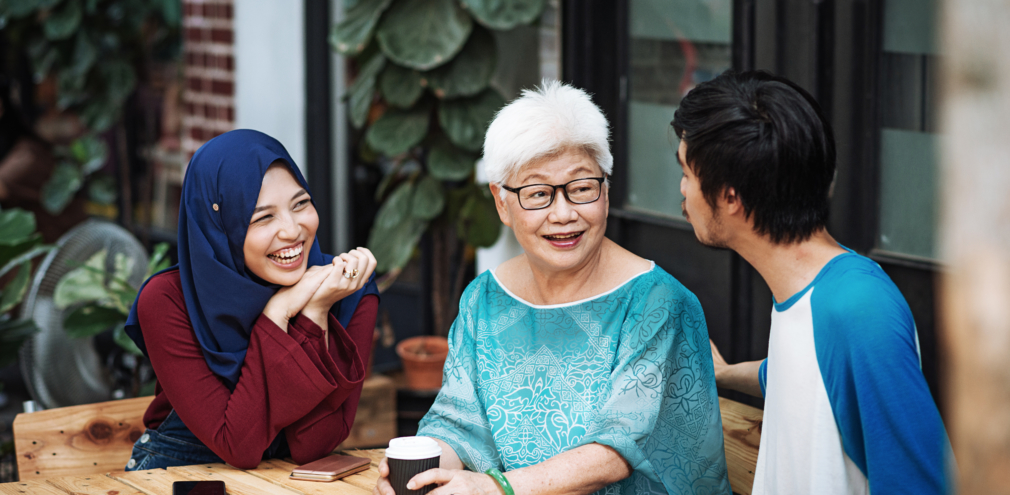
“Millennials play a much bigger role caregiving in the lives of older adults than probably any generation before them, and they don’t get any credit for that.”
– Bruce Chernof, MD President and CEO The SCAN Foundation
For as long as I could remember, she was my rock. Now I’m hers.
It’s time to recast the “me-first” image with the more accurate role millennials serve as family caregivers. Show your support for millennial caregivers, become informed, and share your story using #YouGiveACare.
- 10 Things You Need to Know. Learn 10 things for how to take on a caregiving role as a young adult balancing your own needs.
- Dig Deeper. We collaborated with AP-NORC to learn more about younger adults’ experiences with long-term care, and how they adapt to caregiving.
The Cost of Caregiving in the Millennial Moment
We honor caregivers of all generations, particularly younger adults whose unique experiences must be fully understood. Trying to balance caregiving with other goals, millennials are the new sandwich generation. This video from Vox Creative provides insight on how we may be able to support millennials during their caregiving journeys.
What’s the Story?
One out of three millennials provide care to an older friend or relative—while pursuing educational goals, career advancement, relationships, and social connections. Another third believe they will be providing this kind of support in the next five years. Have you thought about what that may be like?
Lisette Gives a Care
Lisette Carbajal’s father got sick during her third year in college. She finished her degree, but life was a logistical and emotional balancing act. Eventually, Lisette’s dad moved into a full-time care facility. While working in Richmond, Va., and planning a wedding, Lisette continued to be her dad’s caregiver, his “person.” She finds comfort in knowing others have similar experiences.
Martin Gives a Care
In Springfield, Mo., Daisy Duarte’s daily schedule revolves around caring for her mother. Daisy's nephew, Martin Prado, volunteered to help as his grandmother needed more care. Whether it’s feeding her meals or making sure she’s safe, Daisy and Martin strive to adapt to their loved one’s changing needs. It’s a difficult job that many do with love, responsibility, and honor.
Rachel Gives a Care
Growing up, Rachel Hiles' grandmother Barbara played a huge role in raising Rachel and championing her career aspirations. After a series of falls landed Barbara in the hospital, the tables shifted. As Barbara’s primary caregiver, Rachel works to support her grandma’s quality of life while pursuing her own future goals in Kansas City, Mo.
Why They Care
We are raising awareness about the prevalence of caregiving among younger adults by showcasing real stories of individuals providing care. Three millennial caregivers share why they provide care to their loved ones.
“When I learned that there are so many other millennial caregivers, I was just blown away because when I first started sharing my dad’s story, I felt like I had no one to relate to. I “give a care” for my dad by sharing his story every chance I get.”
– Lisette Carbajal Richmond, Va.


